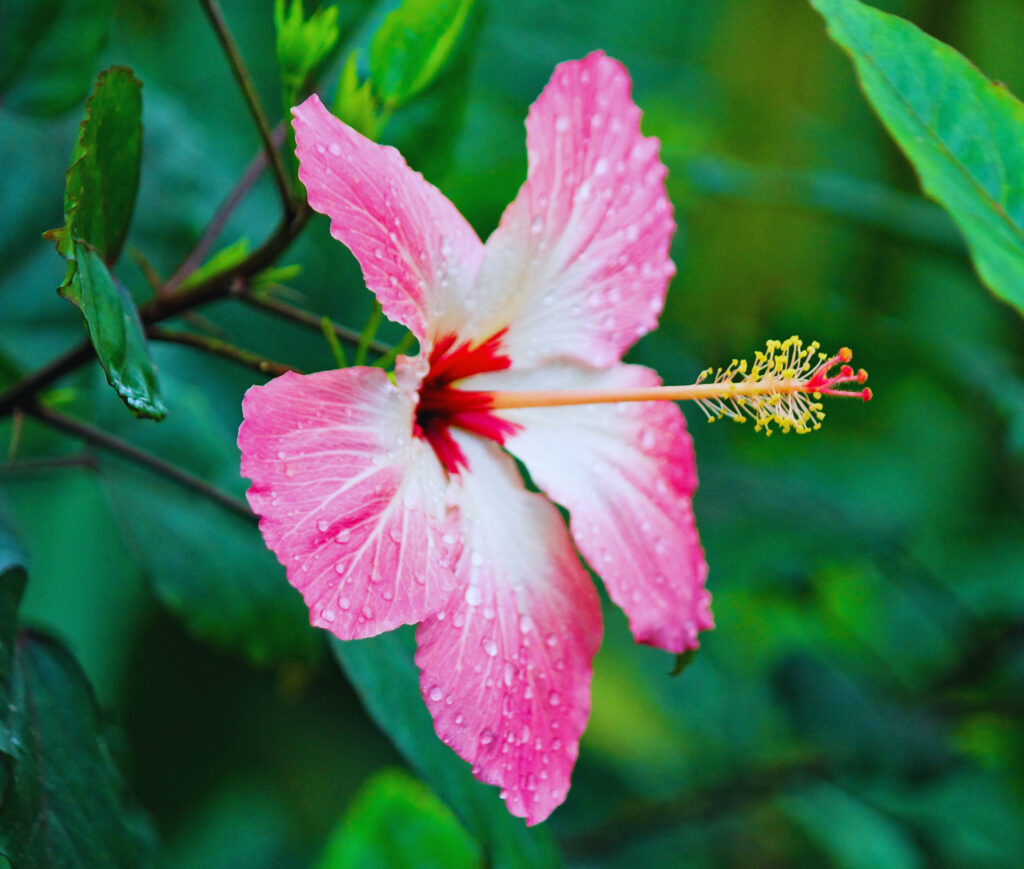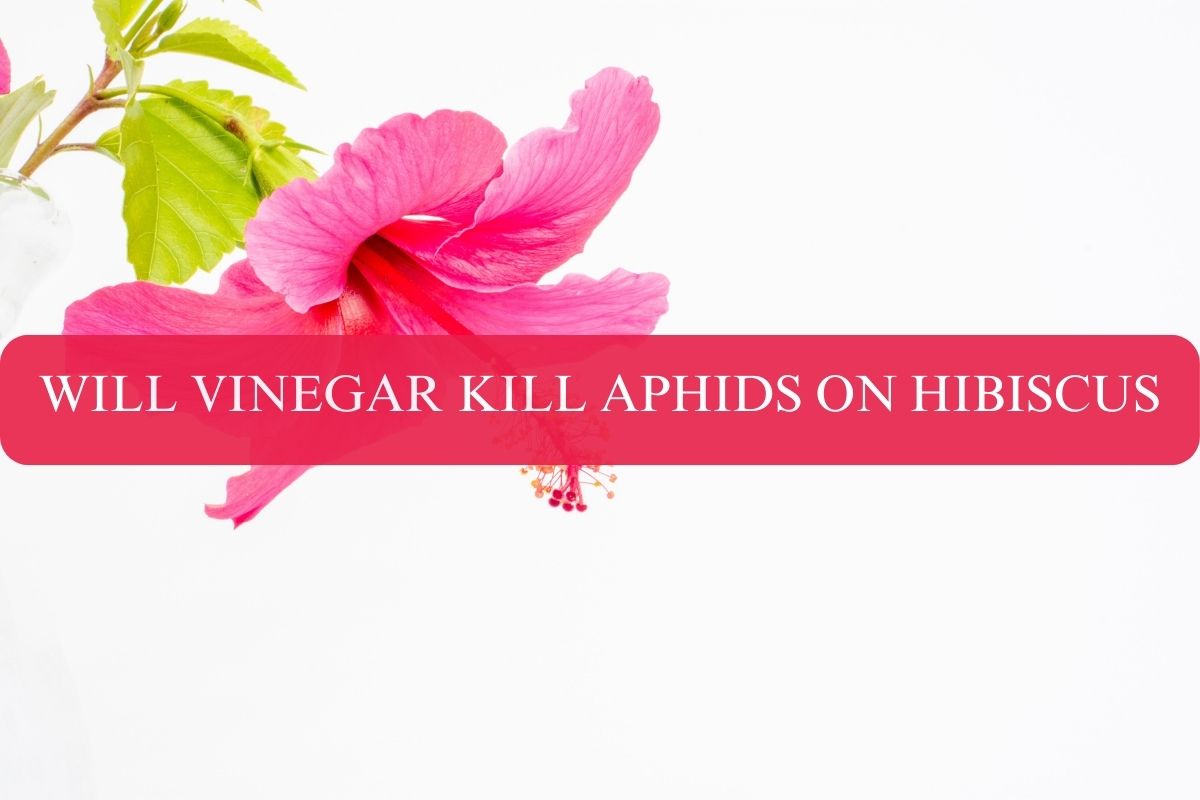Did you know that vinegar, the kitchen staple, possesses a hidden power to combat the notorious aphids lurking on your precious hibiscus? Yes, it’s true! These tiny, sap-sucking insects may seem invincible, but vinegar holds a secret weapon against their onslaught. With its acidic nature, vinegar disrupts the aphids’ protective shield, leaving them defenseless and ultimately leading to their demise.
So, prepare to witness the remarkable alliance between hibiscus and vinegar as they join forces in a botanical battle for survival. Stay tuned as we unravel the fascinating world of natural remedies and the astonishing ways in which everyday ingredients can safeguard your garden’s delicate balance. The saga of will vinegar kill aphids on hibiscus!

How To Make A Vinegar-Based Solution To Kill Aphids (Step By Step Guide)
To create a vinegar-based solution that effectively targets aphids, follow these simple steps:
What You Will Need
- Distilled white vinegar or apple cider vinegar: Pick one of these kinds of vinegar to be the main part of your solution. Both work effectively against aphids.
- Water: You’ll need water to dilute the vinegar and create a milder solution that is safe for your plants.
- Spray bottle: Get a clean spray bottle that is suitable for holding and spraying the vinegar solution. Make sure it’s in good working condition and has not been used for harmful chemicals previously.
- Optional: Liquid dish soap or mild liquid insecticidal soap. Adding a small amount of soap to the vinegar solution can enhance its effectiveness by breaking down the aphids’ protective coating. However, this ingredient is optional and not necessary for the solution to work.
- Protective gear: It’s advisable to wear gloves and eye protection while handling the vinegar solution, especially if you have sensitive skin or are working with a larger quantity of the solution.
Step 1: Gather the ingredients
You will need distilled white vinegar, water, liquid dish soap or mild liquid insecticidal soap (optional), and a spray bottle.
Step 2: Prepare the spray bottle
Clean the spray bottle thoroughly to remove any residue or chemicals from previous use. This helps prevent contamination and ensures the effectiveness of the solution.
Step 3: Mix the solution
In the spray bottle, combine equal parts vinegar and water. For example, add 1 cup of water to 1 cup of vinegar.. This dilution helps prevent damage to your plants while still being effective against aphids.
Step 4: Shake well
Close the spray bottle tightly and shake it vigorously to ensure thorough mixing of the ingredients.
Step 5: Test spray
Before applying the solution to your entire hibiscus plant, test it on a small, inconspicuous area to check for any adverse reactions. Wait 24 hours and observe the plant for any signs of damage or sensitivity.
Step 6: Spray the affected areas
Once you know the solution is safe for your plant, spray it directly on the parts of your hibiscus where the aphids are. Pay close attention to the undersides of the leaves where aphids tend to hide.
Step 7: Reapply as needed
Monitor your hibiscus regularly and reapply the vinegar solution every few days or when new aphid infestations occur. Consistency is important for effectively controlling aphids.
How to Get Rid of Aphids on Hibiscus Plants
In the springtime, aphids are a common pest on many plants, including hibiscus. It can be difficult to clear Hibiscus shrubs and trees of the aphid parasites.These steps will eliminate aphids from hibiscus:
STEP 1:
Check your hibiscus plant for aphids. Small, soft-bodied insects gather on leaves, buds, stems, and leaf undersides. Aphids are green, black, brown, or yellow.
STEP 2:
For a small infestation, wipe the aphids off the plant with a soft cloth or spray them with water. Hand or hose.
STEP 3:
Remove heavily affected branches or buds if the infestation is localized. To avoid aphids, dispose of clipped debris away from your yard.
STEP 4:
You can use either of the following methods to do so:
- Aphids can be controlled with organic insecticide neem oil spray. Spray the hibiscus plant with neem oil mixed with water. Neem oil destroys and interrupts aphid life cycles.
- Mix equal parts water and vinegar in a spray container to make a vinegar solution. Cover aphids with this solution. Repeat until the infestation is gone.
- Insecticidal soap kills soft-bodied insects like aphids. Spray the plant’s damaged regions as directed.
STEP 5:
Use these for serious infestations. Aphids die when they eat these. Ask a garden center or professional for advice and products.
STEP 6:
After doing these steps, check your hibiscus plant for aphids. Check new growth and leaf undersides regularly. Stop new infestations by acting quickly.
These measures plus excellent garden hygiene help manage and eliminate aphids on hibiscus plants.
How Long Does Vinegar Take To Kill Aphids on a Hibiscus?
Vinegar can kill aphids on hibiscus plants in a few hours to several days, depending on its potency, the infestation, and how well it is applied.
Aphids may take some time to die after being treated with a vinegar solution. Vinegar kills aphids by dissolving their waxy exoskeleton and gradually dehydrating them. Aphids exposed to the vinegar solution may not die for several hours or even days.
It may take numerous applications of vinegar to significantly reduce the aphid population, as vinegar is not as effective as conventional insecticides. Until the infestation is under control, it is necessary to use the vinegar solution again every few days.
Vinegar can be an effective aphid control strategy, but only if used consistently and persistently. The success of the treatment can be safeguarded through regular monitoring and subsequent applications. In addition, enhancing vinegar’s overall efficacy in reducing aphids on hibiscus plants can be done by mixing it with other natural therapies or integrated pest management measures.
How To Use Vinegar On Aphids More Safely
When dealing with aphids on your hibiscus plants, vinegar can be a safe and natural solution. Use vinegar safely to protect your plants and surroundings. By following some guidelines, you can harness the power of vinegar effectively and safely to combat aphids. Here’s how to use vinegar on aphids more safely:
Create A Vinegar Solution In A Jug
To create a vinegar solution in a jug, begin by obtaining a clean jug with a secure lid. Then, combine equal parts distilled white vinegar or apple cider vinegar with water in the jug. For example, add 1 cup of water to 1 cup of vinegar. Optionally, you can enhance the solution by adding a few drops of liquid dish soap or mild liquid insecticidal soap.
Secure the lid tightly on the jug and shake it vigorously to ensure thorough mixing of the ingredients. Your vinegar solution is now ready for use. Remember to test it on a small area of your plant before applying it extensively and to follow safe usage practices.
Position Near Your Hibiscus
To safely position vinegar spray near your hibiscus plants, follow these guidelines. First, stand at a comfortable distance from the plant to avoid accidental contact or overspray. Pay attention to wind direction to prevent the vinegar solution from blowing towards your face or sensitive areas.
Direct the spray bottle towards the aphid-infested areas, focusing on the undersides of leaves and clusters of aphids. Be cautious not to spray vinegar directly on beneficial insects. Dilute the vinegar with water in a spray bottle for a milder solution. Use a gentle spray pattern to avoid damage to the plant and prevent solution splattering.
Consider wearing gloves and eye protection for added safety. By positioning the vinegar spray carefully, you can effectively target the aphids while safeguarding your hibiscus plants.
Other Ways To Kill Aphids on Hibiscus
When faced with an aphid infestation on your hibiscus plants, it’s essential to explore various methods to effectively eliminate these tiny pests. In addition to using vinegar, there are other ways to tackle aphids and restore the health of your hibiscus. Let’s explore some alternative methods for killing aphids on hibiscus plants.
A Hose Down
Using a hose-down technique is an effective and simple way to combat aphids on your hibiscus plants. By positioning yourself near the plants, you can direct a strong stream of water onto the infested areas, such as the undersides of leaves and buds.
The force of the water dislodges and removes aphids from the plant, helping to control their population. It’s important to use a gentle sweeping motion and adjust the water flow to prevent any damage to the plant. Regularly hose down the hibiscus plants, especially when you notice a resurgence of aphids.
This chemical-free, plant-safe technique is environmentally friendly. With consistency and diligence, a hose down can help keep your hibiscus plants free from aphid infestations and promote their healthy growth.
Dish Soap
Using dish soap as a natural solution to combat aphids on hibiscus plants is an effective and environmentally friendly method. By creating a solution of water and mild liquid dish soap, you can suffocate and eliminate aphids. Thoroughly spray the solution onto the aphid-infested areas, focusing on the undersides of leaves where they commonly hide. The soap disrupts their protective coatings and causes them to dehydrate.
To remove residue, rinse the plant with water after letting the solution sit for a few hours. Repeat this process as necessary to control aphid populations. It’s important to use a mild soap without harsh additives and to test the solution on a small area before applying it to the entire plant. With proper application, dish soap can help keep your hibiscus plants free from aphids and promote their overall health.
Neem Oil
Neem oil is a natural and effective solution for tackling aphids on hibiscus plants. By diluting neem oil with water and applying it to the affected areas of the plant, you can disrupt the feeding and reproductive patterns of aphids, ultimately leading to their elimination. Neem oil works by suffocating the pests and repelling them from the plant.
It is important to use high-quality, cold-pressed neem oil and follow the instructions for proper dilution. Apply the solution every 7-10 days or as recommended, ensuring thorough coverage of the aphid-infested parts of the hibiscus plant. Neem oil provides a safe and environmentally friendly option for controlling aphids and promoting the health of your hibiscus plants.
FAQ:
What happens when vinegar is added to hibiscus?
Acids, like vinegar, neutralize alkaline compounds. As a consequence of this, the color of the juice that is obtained by pressing hibiscus blossoms is a brilliant pink.
Can I spray vinegar on my hibiscus?
Vinegar can kill aphids on hibiscus plants, but apply it carefully. Vinegar is corrosive and can damage hibiscus foliage if misused. To reduce plant damage, dilute vinegar with water before spraying. 1:3 vinegar: water is usual. Before applying the vinegar solution to the entire plant, test it on a tiny, inconspicuous area and wait 24 hours for any unwanted effects.
How do you kill aphids with vinegar?
The acetic acid in vinegar can be used to kill aphids when sprayed on them in a 50 percent vinegar and 50 percent water solution.
What kind of vinegar do you use for hibiscus?
White vinegar or distilled white vinegar is best when treating hibiscus plants with vinegar for its healing properties. The greater acidity of white vinegar makes it useful for killing off pests like aphids. White vinegar is the most common, however, apple cider vinegar may work too.
What attracts aphids?
Aphids enjoy nitrogen. Nitrogen, a key plant growth element, attracts them to soft developing plant components. Since seedlings are developing and full of nitrogen, aphids love them.
Conclusion
Vinegar can be a handy and natural tool to combat those pesky aphids on your lovely hibiscus plants. Its acidic powers can help eliminate these little critters, but remember, it’s not an instant knockout. Give it some time and patience, and those aphids will be in for a sour surprise.
Just mix up a vinegar solution, apply it safely, and watch those aphids say goodbye! So, grab your vinegar jug and wage war on those aphids, because your hibiscus deserves to bloom in peace!


